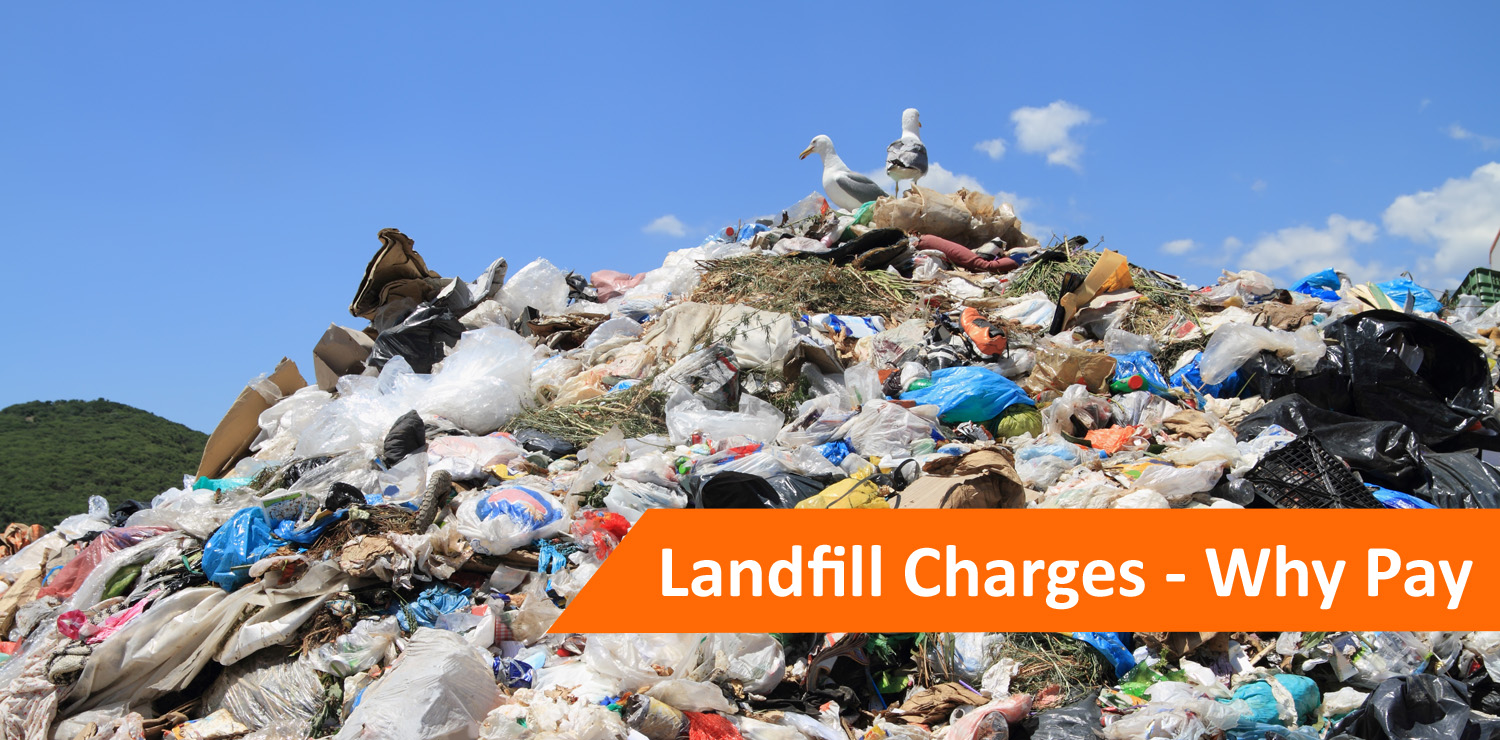Posted on January 19, 2018 in Waste Solutions

With landfill sites based all across the country, you need to be a registered account holder to dispose of waste at your local landfill. Both commercial and household waste ends up in landfills.
With waste disposal charged per tonne and landfill taxes and VAT applied in addition to this, landfill is the least attractive place to dump rubbish.
What type of waste ends up in landfill?
With active waste or green waste comprising of biodegradable materials such as wood, plastic and food, the rates per tonne are much higher than inactive or inert waste which comprises of non-biodegradable materials like stone or builders waste. Inactive materials like stone cannot undergo any further changes to their properties through physical or chemical treatment, so it’s clear to see why the rate is lower than active waste.
Biodegradable waste doesn’t have to end up in landfill. It can be recycled, which explains the higher rates. It’s much more desirable for a local authority to avoid landfill charges to make savings and achieve annual targets.
Recent increases in skip hire charges have been a result of an increase in the skip tax at landfills, where the rate of disposal has increased from £2.50 per tonne to £86.10 per tonne.
What effect does biodegradable waste have on the environment?
The higher rate per tonne also reflects the push to reduce active waste which contributes to the release of greenhouse gases methane and carbon dioxide. The Landfill Directive came into action in the UK in 2002. Before their introduction, the UK was highly dependent on landfill, where 79% of the UK’s waste ended up in landfills and only 12% recycled, with the remaining 8% incinerated.
The Landfill Directives aim is to prevent and reduce harm to the environment by decreasing gases contributing to the greenhouse effect. By 2020, biodegradable waste needs to be reduced to just 35% of the amount of waste landfilled in 1995.
So what are councils doing to reduce landfill waste and charges?
Landfill disposal is expensive and unattractive. An increasing number of public places such as shopping malls, airports, train stations and cinemas are promoting an environmentally friendly approach to provide public recycling bins to help cut the waste that reaches landfills. Public parks such as the Royal Parks of London have also implemented the introduction of recycling bins to collect paper, cans, glass and plastics.
The Department for Environment and Environment Agency have produced a combined policy aimed to tackle the reduction of waste. The following outline a summary of some of the actions for waste prevention:
- Encouraging householders to reduce food waste through their websites by providing tips on how to compost and plan meals effectively to minimise food waste
- Working closely with businesses on how to manage and reduce their waste
- Administering fines and penalties for fly tipping
- Improving recycling facilities and waste collection from homes
- Closer regulation and monitoring of landfill sites
- Controlling tyre disposals and hazardous material disposal
Protech collect your waste and ensure it takes an environmental route to disposal. To find out more about how we can dispose of your commercial and domestic waste, call us on 0845 604 1288.
For information on our Waste Service please click Protech Waste Solutions.
Categories
- Building Maintenance
- Cleaning
- Electrical
- Gardening
- General Info
- Our Service
- Pest
- Security
- Uncategorized
- Waste Solutions
Archive
- April 2024
- March 2024
- February 2024
- January 2024
- December 2023
- November 2023
- August 2023
- April 2023
- February 2023
- January 2023
- December 2022
- November 2022
- October 2022
- September 2022
- August 2022
- July 2022
- June 2022
- May 2022
- April 2022
- March 2022
- February 2022
- January 2022
- December 2021
- October 2021
- September 2021
- August 2021
- July 2021
- June 2021
- May 2021
- April 2021
- March 2021
- February 2021
- January 2021
- December 2020
- November 2020
- October 2020
- September 2020
- August 2020
- July 2020
- June 2020
- May 2020
- April 2020
- March 2020
- February 2020
- January 2020
- December 2019
- November 2019
- October 2019
- September 2019
- August 2019
- July 2019
- June 2019
- May 2019
- April 2019
- March 2019
- February 2019
- January 2019
- December 2018
- November 2018
- October 2018
- September 2018
- August 2018
- July 2018
- June 2018
- May 2018
- April 2018
- March 2018
- February 2018
- January 2018
- December 2017
- November 2017
- October 2017
- September 2017
- August 2017
- July 2017
- June 2017
- May 2017
- April 2017
- March 2017
- February 2017
- January 2017
- December 2016
- November 2016
- October 2016
- September 2016
- August 2016
- July 2016
- June 2016
- May 2016
- April 2016
- March 2016
- February 2016
- January 2016
- December 2015
- November 2015
- October 2015
- September 2015
- August 2015
- July 2015
- June 2015
- May 2015
- April 2015
- March 2015
- February 2015
- January 2015
- October 2014
- May 2013
- April 2013
- November 2011
- September 2011
- June 2011
- January 2011
- December 2010
- November 2010

